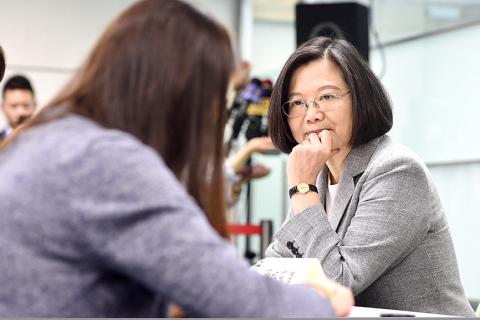President Tsai Ing-wen (蔡英文) yesterday registered as a candidate in the Democratic Progressive Party’s (DPP) presidential primary, saying that Taiwan and the party need her.
Tsai said that she is seeking re-election because she believes the DPP and Taiwan need her, not “despite Beijing’s opposition,” as her critics have said.
She made the remarks to reporters at the party’s headquarters in Taipei hours before she departed for an eight-day state visit to Palau, Nauru and the Marshall Islands.

Photo: Peter Lo, Taipei Times
Tsai, who stepped down as DPP chairperson on election night last year after the party’s losses in the Nov. 24 local elections, said she believes a candidate must fulfill three requirements to become president:
First, the candidate must be familiar with international affairs and capable of dealing with different groups, politicians and representatives, she said.
Taiwan faces external threats and pressure, as well as challenges from within, so it must strengthen its connection with the international community and with nations that share similar values, she said.
Second, the candidate must be able to withstand pressure and criticism as they tackle problems that those in power have avoided for too long, she said.
Those in power need to take up the responsibility of handling problems that have prevented society from progressing, Tsai said, adding that many people would oppose the changes caused by reform, but the president must let neither praise nor criticism affect them.
Third, a president must be “not only a star player ... but also a good captain,” and deal with even the most ordinary of tasks, she said.
Taiwan needs a candidate who can unite the DPP, as well as like-minded groups in society, she said.
Tsai said she believes she fulfills all three requirements.
Former premier William Lai (賴清德), who on Monday entered the DPP race, said on Wednesday that he would suspend campaign activities until Tsai returns from her trip on Thursday next week.
Tsai said that while she appreciates Lai’s intention, it is unnecessary.
Since the primary process is short, Lai should use the time to communicate with the public about why he is running, she said.
Tsai also said it was too early to discuss the possibility of her and Lai running on the same ticket as president and vice president.
Asked whether she would support Lai if he wins the primary, Tsai said that her focus at the moment is on winning.
The DPP is expected to nominate a presidential candidate by middle of next month, DPP Chairman Cho Jung-tai (卓榮泰) said.
The Central Election Commission on Tuesday announced that the presidential and legislative elections are to be held on Jan. 11 next year.

MAKING WAVES: China’s maritime militia could become a nontraditional threat in war, clogging up shipping lanes to prevent US or Japanese intervention, a report said About 1,900 Chinese ships flying flags of convenience and fishing vessels that participated in China’s military exercises around Taiwan last month and in January last year have been listed for monitoring, Coast Guard Administration (CGA) Deputy Director-General Hsieh Ching-chin (謝慶欽) said yesterday. Following amendments to the Commercial Port Act (商港法) and the Law of Ships (船舶法) last month, the CGA can designate possible berthing areas or deny ports of call for vessels suspected of loitering around areas where undersea cables can be accessed, Oceans Affairs Council Minister Kuan Bi-ling (管碧玲) said. The list of suspected ships, originally 300, had risen to about

DAREDEVIL: Honnold said it had always been a dream of his to climb Taipei 101, while a Netflix producer said the skyscraper was ‘a real icon of this country’ US climber Alex Honnold yesterday took on Taiwan’s tallest building, becoming the first person to scale Taipei 101 without a rope, harness or safety net. Hundreds of spectators gathered at the base of the 101-story skyscraper to watch Honnold, 40, embark on his daredevil feat, which was also broadcast live on Netflix. Dressed in a red T-shirt and yellow custom-made climbing shoes, Honnold swiftly moved up the southeast face of the glass and steel building. At one point, he stepped onto a platform midway up to wave down at fans and onlookers who were taking photos. People watching from inside

Japan’s strategic alliance with the US would collapse if Tokyo were to turn away from a conflict in Taiwan, Japanese Prime Minister Sanae Takaichi said yesterday, but distanced herself from previous comments that suggested a possible military response in such an event. Takaichi expressed her latest views on a nationally broadcast TV program late on Monday, where an opposition party leader criticized her for igniting tensions with China with the earlier remarks. Ties between Japan and China have sunk to the worst level in years after Takaichi said in November that a hypothetical Chinese attack on Taiwan could bring about a Japanese

STREAMLINED: The dedicated funding would allow the US to transfer equipment to Taiwan when needed and order upgraded replacements for stockpiles, a source said The US House of Representatives on Thursday passed a defense appropriations bill totaling US$838.7 billion, of which US$1 billion is to be allocated to reinforcing security cooperation with Taiwan and US$150 million to replace defense articles provided to the nation. These are part of the Consolidated Appropriation Act, which the US House yesterday passed with 341 votes in favor and 88 against. The act must be passed by the US Senate before Friday next week to avoid another government shutdown. The US House Committee on Appropriations on Monday unveiled the act, saying that it allocates US$1 billion for the Taiwan Security Cooperation Initiative